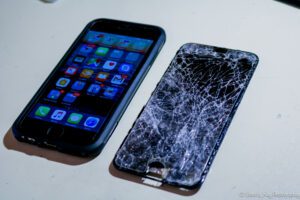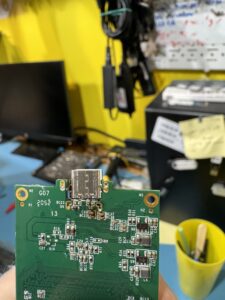03.18.24
Business Spotlight: The Lab
Entrepreneurship has been described as a great equalizer, creating opportunities for a wide range of people a variety of communities. As part of our Entrepreneurship for All initiative, we asked small business owners to share their stories of starting a business in rural communities.
One of those owners was Lyle Schrock, owner of The Lab in Warsaw. Rhonda Ladig, Director of Strategic Initiatives at the NIIC, sat down with Schrock for a quick Q & A.
RL: How did you become a business owner?
LS: It was literally an accident that led to me starting The Lab in 2016. Up until that time, I had always known that I wanted to run my own business, but I never knew what that would be. I tried a lot of things—and failed at a lot of things.
Then in 2015, I dropped my phone and broke the screen. I was always raised to fix my own stuff. Growing up Amish, we didn’t have the luxury to just get in a car and go get something fixed. So I decided to fix the broken screen myself. I have an engineer’s mind and like solving problems and coming up with new ways to improve things. So from there, I began to repair my friends’ devices, and the business just continued to grow until it became full time.
We’re also experimenting with a mobile unit business idea that we plan to deploy in places such as Columbia City and Fort Wayne. The whole idea behind the mobile unit is that people want convenience. The mobile unit will be like a food truck and go to places where people are working or shopping during the day.
 RL: What do you think is different for your business, running it in this smaller community, versus how you would see running it in a more urban community, such as Fort Wayne?
RL: What do you think is different for your business, running it in this smaller community, versus how you would see running it in a more urban community, such as Fort Wayne?
LS: In an urban community, a lot more people resort to looking online to find the businesses and services they need. In a smaller community, people really know each other. It’s a tighter community, and people rely a lot more on recommendations. We really pride ourselves on being next-level in customer care and fully helping the customer with what’s best for them. I always teach my employees that if we do this right and we gain the trust of the community, we will always have a business and be able to support ourselves. Because people, when they trust you, will follow you in whatever you do.
RL: What are the challenges for growing your business in your local community?
LS: Being in a smaller, local community, you only have so many people to tap into, and only a certain percentage of those people might want to get a device repaired. So growth comes from adding services. For us, that happened pretty naturally. Our customers began to ask us if we could repair not just their phones but also their tablets and laptops. We sometimes repair vintage equipment and even manufacturing devices through board-level repair, which is a huge thing.
Usually that type of work is a West Coast/East Coast kind of thing. It might be a million-dollar machine, but the manufacturers say, “No, we won’t repair this, because we don’t support this machine anymore.” So we repair the board and charge the client $500, where otherwise they would have had to buy a brand-new machine. But getting the parts and schematics is sometimes a challenge, and of course you have to expand your knowledge constantly.
 RL: If you had a magic wand for solving one problem for your business, what would it be?
RL: If you had a magic wand for solving one problem for your business, what would it be?
LS: We’re constantly fighting to be able to get parts, or to get the schematics of parts. The Right to Repair movement is huge, and very needed, because all these companies are serializing their technology to each part. They’re basically saying, “Hey, we want a monopoly over all repair parts coming into the country. Nobody gets repair parts unless we say okay.” So being able to get parts, without it being really expensive, is a huge thing.
Thankfully, there’s been a push in recent years for Right to Repair legislation, which is a good thing, so that we can increase product longevity and general sustainability. Many times, you can save 80% on average if you go the repair route. So we really need to raise awareness about the repairability of devices.
RL: Thank you all for all your information and insights. It’s helpful to hear the real stories of what entrepreneurs go through, and what they need.

